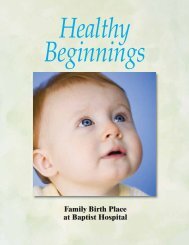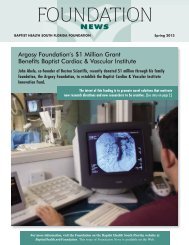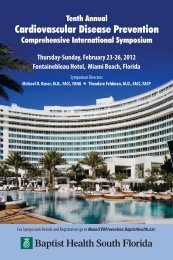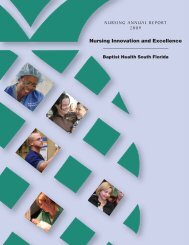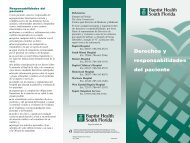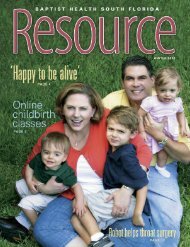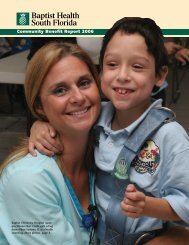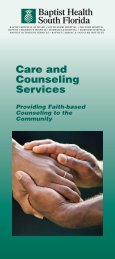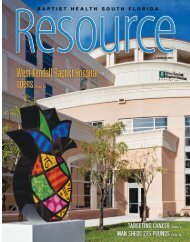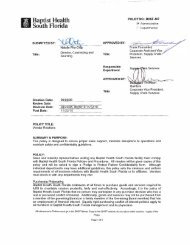2010-2011 Annual Report - Baptist Health South Florida
2010-2011 Annual Report - Baptist Health South Florida
2010-2011 Annual Report - Baptist Health South Florida
Create successful ePaper yourself
Turn your PDF publications into a flip-book with our unique Google optimized e-Paper software.
<strong>2010</strong>-<strong>2011</strong> <strong>Annual</strong> <strong>Report</strong>
Dear Colleagues and Friends:<br />
On behalf of <strong>Baptist</strong> <strong>Health</strong> Cancer Services,<br />
I am pleased to share with you our <strong>2010</strong>-<strong>2011</strong><br />
Cancer <strong>Annual</strong> <strong>Report</strong>. It features our Cancer Data<br />
Services’ <strong>2010</strong> statistics for <strong>Baptist</strong>, <strong>Baptist</strong> Children’s and<br />
<strong>South</strong> Miami Hospitals, as well as some highlights and<br />
accomplishments of <strong>2011</strong>.<br />
Our cancer program features a network of facilities and<br />
services that treated 3,644 adults and children in <strong>2010</strong>. We<br />
offer comprehensive cancer care at <strong>Baptist</strong> and <strong>South</strong><br />
Miami Hospitals, while selected services mentioned in this<br />
report are also available at other <strong>Baptist</strong> <strong>Health</strong> facilities.<br />
In <strong>2011</strong>, nine of our medical and radiation oncologists,<br />
as well as gynecological oncologists, general surgeons and<br />
other <strong>Baptist</strong> <strong>Health</strong> specialists, were named “Top Doctors”<br />
by the U.S. News & World <strong>Report</strong>.<br />
Our cancer program is dedicated to supporting research<br />
to find better treatments for cancer and to offer our patients<br />
the latest clinical trials. In <strong>2011</strong>, we remained one of the top contributors of tumor<br />
specimens among a consortium of 18 sites participating in the Tampa-based Moffitt<br />
Cancer Center’s groundbreaking Total Cancer Care (TCC) study. <strong>Baptist</strong> <strong>Health</strong> also<br />
was the only consortium member to take part in Moffitt’s cancer research awareness<br />
reception last March at the National Press Club in Washington, D.C.<br />
Our busy robotic surgery program continues to grow, now featuring seven da Vinci<br />
Robotic Systems, including one at Doctors Hospital, new in <strong>2011</strong>. In June, almost<br />
2,500 Internet users watched a live webcast of one of our thoracic surgeons performing<br />
robot-assisted surgery for early-stage lung cancer at <strong>South</strong> Miami Hospital. In November,<br />
six expert surgeons from <strong>Baptist</strong> <strong>Health</strong> served on the faculty of the Clinical Robotic<br />
Surgery Association’s Third Worldwide Congress in Houston.<br />
<strong>Baptist</strong> <strong>Health</strong>’s palliative care program, an integral part of our philosophy of patientand<br />
family-centered care, addresses the physical, intellectual, emotional, psychosocial<br />
and spiritual needs of our patients and their loved ones. At <strong>Baptist</strong> Hospital in <strong>2011</strong>, the<br />
number of patients who received palliative care jumped 75 percent compared from the<br />
previous year. Our palliative care training program has been so successful that we now<br />
share the training with healthcare professionals from other hospital systems in Miami-<br />
Dade and Broward counties, including Jackson Memorial Hospital and Broward <strong>Health</strong>.<br />
We are also actively engaged in the community through such outreach programs as<br />
free health screenings, educational seminars and fundraising events. For example, in<br />
<strong>2011</strong> <strong>Baptist</strong> and Homestead Hospitals’ Relays for Life raised a combined $295,000<br />
for American Cancer Society research, education and patient services.<br />
Finally, I have this exciting news to share: <strong>Baptist</strong> <strong>Health</strong> has committed to building a<br />
world-class, comprehensive cancer center, including a research facility, on the <strong>Baptist</strong><br />
Hospital campus. This center, scheduled to open in about three years, will consolidate<br />
many of <strong>Baptist</strong> <strong>Health</strong>’s cancer services under one roof.<br />
I would like to recognize and sincerely thank the volunteer members of our<br />
multidisciplinary Cancer Committee for their dedication and professionalism (see the<br />
list of members on the back cover). Together, we strive to provide comprehensive and<br />
compassionate cancer services to our patients and the community.<br />
Grace Wang, M.D.<br />
Chairwoman, Cancer Committee, <strong>Baptist</strong> <strong>Health</strong><br />
Grace Wang, M.D., meets with a patient for follow-up. Dr. Wang not<br />
only has a busy medical oncology practice, she chairs <strong>Baptist</strong> <strong>Health</strong>’s<br />
Cancer Committee. She’s also actively involved with the local chapter<br />
of the American Cancer Society, Day of Caring for Breast Cancer<br />
Awareness and the Cancer Support Community.<br />
ON THE COVER:<br />
Seven-year-old Daniela<br />
Hoyos was successfully<br />
treated for Burkitt’s<br />
lymphoma at <strong>Baptist</strong><br />
Children's Hospital.<br />
See story on page 9.
DIAGNOSIS AND TREATMENT<br />
Research<br />
In <strong>2011</strong>, <strong>Baptist</strong> <strong>Health</strong> physicians offered cancer<br />
patients 77 clinical trials — 35 for adults and 42 for<br />
children. Our Institutional Review Board (IRB)<br />
considered protocols for 219 research studies, including<br />
11 new cancer trials. The IRB also developed a self-study<br />
Continuing Medical Education (CME) booklet, Investigating<br />
Responsibilities When Conducting Human Subject<br />
Research, to support and promote the clinical trial process<br />
at <strong>Baptist</strong> <strong>Health</strong>. This publication is designed to help<br />
principal investigators understand and meet their obligations<br />
for conducting human research. It includes guidance on<br />
how to supervise a clinical study in which some tasks are<br />
delegated to employees, colleagues or third parties; and<br />
how to protect the rights, safety and welfare of the study’s<br />
subjects. Course booklets are available through the IRB<br />
and the <strong>Baptist</strong> <strong>Health</strong> CME Department.<br />
In <strong>2011</strong>, <strong>Baptist</strong> <strong>Health</strong> continued its prominent role<br />
with the Moffitt Cancer Center’s groundbreaking Total<br />
Cancer Care (TCC) study, which is gathering data on the<br />
genetic profile of tumors. We were one of the top contributors<br />
of tumor specimens, among 18 consortium sites for<br />
this study, which is creating an unprecedented database of<br />
specimens and patient information to support cancer<br />
diagnosis, prognosis and response to treatment. <strong>Baptist</strong><br />
<strong>Health</strong> also was the only consortium member to take part<br />
in Moffitt’s cancer research awareness reception in March<br />
at the National Press Club in Washington, D.C., attended<br />
by about 100 political leaders. For the TCC study, about<br />
70 surgeons at <strong>Baptist</strong> Hospital, <strong>South</strong> Miami Hospital<br />
and Doctors Hospital collected 667 tissue samples in <strong>2011</strong><br />
and we enrolled 1,068 patients. Our patient consent rate<br />
for a tissue sample increased to 62.45 percent, from 59.93<br />
percent in <strong>2010</strong>.<br />
Our medical oncologists offered 35 clinical trials in<br />
<strong>2011</strong> for cancer sites including breast, brain, blood, head<br />
and neck, cervix, lung, pancreas, prostate and colon. We<br />
are the only site in <strong>Florida</strong> offering a Phase II study for<br />
patients with advanced or recurrent non-small cell lung<br />
cancer. This study is evaluating the safety and effectiveness<br />
of an investigational drug, known as GDC-0941, which<br />
has been shown in lab experiments to prevent or slow the<br />
growth of many different types of human cancer cells.<br />
<strong>Baptist</strong> <strong>Health</strong>’s radiation oncology trials are carried<br />
out in cooperation with the Radiation Therapy Oncology<br />
Group (RTOG), a national research organization funded<br />
by the National Cancer Institute. Eleven studies were open<br />
to patients in <strong>2011</strong> for cancers of the breast, head and<br />
neck, lung, prostate, cervix and esophagus. One promising<br />
study is a Phase I/II trial for patients with medically<br />
inoperable, early-stage, centrally located non-small cell<br />
lung cancer. That study will look at the effectiveness of<br />
stereotactic radiotherapy to the lung.<br />
In addition to the RTOG trials, <strong>Baptist</strong> Hospital’s<br />
radiation oncologists develop and implement their own<br />
IRB-approved, intramural studies. One of those studies,<br />
“Accelerated Partial Breast Irradiation Is Safe and Effective<br />
Using IMRT in Selected Early-Stage Breast Cancer<br />
It’s hard to believe that anyone could miss<br />
going to radiation therapy sessions, but that’s<br />
exactly how SHARI ALLEN said she felt after<br />
completing breast cancer treatment at the<br />
<strong>South</strong> Miami Hospital Radiation Therapy<br />
Department. “Frankly,” said the 53-year-old<br />
retired Miami-Dade Police sergeant, “I was<br />
floored by the experience in a very positive<br />
way. Everyone was so kind, caring and personable.<br />
I felt like they were extended family.” The<br />
staff’s commitment to putting the patient first<br />
impressed Ms. Allen. She also enjoyed the<br />
unexpected extras she was offered, such as free<br />
massage. “They had such a personal approach.”
A chest X-ray ANA SYLVIA LOUZADO needed for<br />
upcoming knee surgery discovered a small mass in the<br />
60-year-old’s left lung. After tests determined that it was<br />
early non-small cell lung cancer, her knee surgery was put<br />
on hold. Instead, doctors performed robot-assisted<br />
surgery at <strong>South</strong> Miami Hospital to remove a lobe of her<br />
lung. Before Ms. Louzado’s surgery, a nurse from <strong>Baptist</strong><br />
<strong>Health</strong>’s Center for Research & Grants asked if she would<br />
be willing to donate a small slice of tissue from the mass<br />
after its removal. The tissue would be sent for genetic<br />
analysis as part of Moffitt Cancer Center’s groundbreaking<br />
study, Total Cancer Care. “Of course!” said the feisty<br />
Ms. Louzado. “I would do anything to help other people<br />
with cancer. I want to be an example for others to<br />
do the same.”<br />
Because Ms. Louzado’s robot-assisted surgery was<br />
minimally invasive, she had very little pain and recovered<br />
in only three weeks. Chemotherapy followed. Today, she<br />
has completed treatment and is back at work as a<br />
preschool teaching assistant, free of cancer.<br />
Patients,” was published in the summer of <strong>2011</strong> in the<br />
International Journal of Radiation Oncology * Biology *<br />
Physics. Instead of the usual six weeks of radiation to the<br />
entire breast, patients in the study received radiation twice<br />
a day for five days only to the part of the breast near the<br />
tumor site. Five years after the study began, 97 percent of<br />
the patients were still breast cancer-free and 94 percent<br />
considered the cosmetic results “excellent” or “good,”<br />
according to the journal article.<br />
In <strong>2011</strong>, our pediatric cancer specialist at <strong>Baptist</strong><br />
Children’s Hospital offered young patients 35 clinical<br />
trials in cooperation with the Children’s Oncology Group,<br />
a national research organization. Forty-nine children<br />
participated in those trials, which focused on leukemia, non-<br />
Hodgkin’s lymphoma, neuroblastoma, rhabdomyosarcoma<br />
and osteosarcoma, as well as other childhood cancers. Of<br />
25 newly diagnosed patients, 15 joined a clinical trial.<br />
Robot-assisted Surgery<br />
<strong>Baptist</strong> <strong>Health</strong>’s active and growing robotic surgery<br />
program allows our cancer surgeons to perform<br />
highly precise, minimally invasive operations for<br />
prostate, gynecologic, lung, esophageal, head and neck,<br />
kidney and colon cancer. We have seven da Vinci Robotic<br />
System robots — four at <strong>South</strong> Miami Hospital, two at<br />
<strong>Baptist</strong> Hospital and, new in <strong>2011</strong>, one at Doctors Hospital.<br />
<strong>South</strong> Miami Hospital’s Center for Robotic Surgery, one<br />
of the busiest in the region, continued to grow in <strong>2011</strong>,<br />
with an increase in volume of 20 percent over the previous<br />
year. In June, almost 2,500 people clicked in to watch a<br />
live webcast of one of our thoracic surgeons performing<br />
robot-assisted surgery for early-stage lung cancer at <strong>South</strong><br />
Miami Hospital. The webcast, moderated in English and<br />
Spanish, also featured comments from a patient who had<br />
undergone the same procedure. Since its live broadcast,<br />
another 7,500 Internet users have viewed the webcast.<br />
<strong>Baptist</strong> <strong>Health</strong> ear, nose and throat specialists perform<br />
robotic surgery through the mouth on select head and neck<br />
tumors. In <strong>2011</strong>, they used the robot for surgery on the<br />
tonsils, base of the tongue, epiglottis, nasopharynx and<br />
pharynx. Using the robot for these surgeries requires<br />
special expertise and helps minimize extensive, disfiguring<br />
and painful surgery often associated with head and neck<br />
cancer surgery.<br />
More than half a dozen <strong>Baptist</strong> <strong>Health</strong> physicians<br />
served on the faculty of the Clinical Robotic Surgery<br />
Association’s Third Worldwide Congress in Houston,<br />
Texas, in November <strong>2011</strong>. They lectured and led sessions<br />
about robotic approaches for bariatric and thoracic surgery,<br />
hernia repair, and rectal and colon surgery, among others.<br />
2
Also in November, <strong>Baptist</strong> <strong>Health</strong> sponsored a robotic<br />
surgery symposium in Santo Domingo, Dominican<br />
Republic, attended by about 200 physicians. Four <strong>Baptist</strong><br />
<strong>Health</strong> robotic surgery experts spoke about various robotic<br />
surgery approaches.<br />
After its successful inaugural symposium in late <strong>2010</strong>,<br />
<strong>South</strong> Miami Hospital’s Center for Robotic Surgery was<br />
planning a second medical education symposium, set for<br />
February 2012, on the latest robotic surgery uses and<br />
techniques. The first symposium drew doctors from as<br />
far away as India and Singapore.<br />
Interventional Radiology<br />
<strong>Baptist</strong> <strong>Health</strong> interventional radiologists at <strong>Baptist</strong><br />
Cardiac & Vascular Institute, on the <strong>Baptist</strong><br />
Hospital campus, and at <strong>South</strong> Miami Heart<br />
Center, at <strong>South</strong> Miami Hospital, play an active role in our<br />
cancer program. They offer minimally invasive treatment<br />
options to cancer patients with metastases and inoperable<br />
tumors, through the growing field of interventional<br />
oncology. These treatments often are able to improve<br />
quality of life and prolong life.<br />
3
DIAGNOSIS AND TREATMENT<br />
Interventional oncology is a multispecialty, collaborative<br />
effort, bringing together oncologists, radiation<br />
oncologists, surgeons and interventional radiologists.<br />
Our interventional radiologists perform image-guided<br />
procedures for liver, kidney, lung, adrenal, neuroendocrine,<br />
colorectal and bone cancer. Treatments at the Institute<br />
include radiofrequency and microwave ablation, cryoablation,<br />
transcatheter arterial chemoembolization, transarterial<br />
bland embolization and radioembolization. <strong>South</strong> Miami<br />
Heart Center offers radiofrequency ablation and<br />
cryoablation.<br />
In <strong>2011</strong>, the Institute began using more-advanced<br />
imaging techniques, such as the fusion of images from<br />
multiple modalities, to enhance guidance and precision<br />
for biopsies and treatments. Fusion techniques, such as<br />
overlaying fluoroscopic images with CT or MR images,<br />
not only improve accuracy and clinical outcomes but can<br />
decrease the time a procedure takes, resulting in less<br />
radiation to the patient and less contrast used.<br />
In September, one of the Institute’s experts served<br />
as faculty during an interactive session on complex<br />
chemoembolization cases at the Cardiovascular and<br />
Interventional Radiological Society of Europe meeting in<br />
Munich, Germany. At the Synergy <strong>2011</strong>: A Multidisciplinary<br />
Approach to Interventional Oncology meeting in<br />
Miami Beach, another Institute physician gave the Society<br />
of Interventional Radiology Past President address.<br />
Six interventional radiologists from the Institute were<br />
course directors for the Symposium on Clinical Interventional<br />
Oncology, one of the fastest-growing programs of<br />
the International Symposium on Endovascular Therapy<br />
(ISET), held annually in Miami Beach. A record number<br />
of registrants (nearly 500) from around the world heard<br />
about the latest interventional oncology treatments. Topics<br />
included transcatheter therapy for colorectal cancer liver<br />
metastasis, portal vein embolization and ablative therapies<br />
for hepatocellular carcinoma.<br />
Radiation Oncology<br />
Cancer patients at <strong>Baptist</strong> <strong>Health</strong> have access to the<br />
most-advanced radiation therapy available. Our<br />
multidisciplinary approach ensures that every<br />
patient’s entire medical team is involved in the treatment<br />
plan. In <strong>2011</strong>, the radiation oncology staff at <strong>Baptist</strong><br />
Hospital saw 910 patients in consultation and gave 11,441<br />
radiation treatments to 610 new patients, an increase in<br />
new patients of 22 percent over the previous year. At <strong>South</strong><br />
Miami Hospital, 434 patients were seen in consultation<br />
and 371 new patients received 8,160 radiation treatments.<br />
Also in <strong>2011</strong>, the CT scanner in <strong>South</strong> Miami<br />
Hospital’s Radiation Oncology Department received a<br />
three-year accreditation from the American College of<br />
Radiology (ACR). This unit is used to plan the patient’s<br />
treatment and is <strong>Baptist</strong> <strong>Health</strong>’s only ACR-accredited CT<br />
scanner located outside an imaging department. Our<br />
radiation oncology physics staff worked closely with<br />
<strong>South</strong> Miami Hospital’s Imaging Department to meet the<br />
ACR’s stringent standards.<br />
Both <strong>Baptist</strong> and <strong>South</strong> Miami Hospitals offer external<br />
and internal radiation therapy, including image-guided<br />
radiation therapy (IGRT), intensity-modulated radiation<br />
therapy (IMRT), conformal radiation therapy and<br />
brachytherapy. Both hospitals use onboard imagers to<br />
improve tumor targeting in radiation therapy to the head<br />
and neck, lung, prostate and other pelvic tumors. Realtime<br />
imaging helps doctors make accurate decisions as<br />
the patient receives radiation treatment.<br />
In <strong>2011</strong>, <strong>Baptist</strong> Hospital developed new treatmentplanning<br />
technology and clinical protocols, which will<br />
take effect in 2012. They include an electronic medical<br />
record system, a new brain tumor treatment plan to<br />
decrease cognitive changes, stereotactic body radiation<br />
therapy (SBRT) to treat liver tumors, and software that<br />
incorporates multiple imaging modalities (CT, MRI and<br />
PET/CT) into the treatment-planning process.<br />
4
<strong>South</strong> Miami Hospital remains the only hospital in the<br />
region to have a Tomotherapy external beam treatment<br />
unit. This machine links the accuracy of IMRT with the<br />
image-guided benefits of a built-in CT scanner.<br />
The <strong>Baptist</strong> Hospital Head and Neck Cancer Support<br />
Team is <strong>Baptist</strong> <strong>Health</strong>’s first comprehensive model of<br />
multidisciplinary cancer-site-specific care. Supporting our<br />
philosophy of patient- and family-centered care, the team<br />
includes ear, nose and throat specialists; radiation oncologists;<br />
medical oncologists; radiation therapists; plastic and<br />
oral surgeons; a gastroenterologist; nurses; a dietitian and<br />
social worker. In <strong>2011</strong>, the team saw 178 patients, up from<br />
139 patients in <strong>2010</strong>. Together, team members address the<br />
complex physical<br />
and psychosocial<br />
needs of head and<br />
neck cancer patients<br />
and their families.<br />
The team meets<br />
weekly and creates a<br />
recommended treatment<br />
plan for every<br />
patient and is available<br />
to guide and<br />
support patients and<br />
their families before,<br />
during and after treatment. Also committed to education<br />
and prevention, the team offers free oral cancer screenings<br />
to the community. In <strong>2011</strong>, our oral surgeons examined<br />
more than 100 people at four such screenings. Thirty-nine<br />
people were referred for follow-up.<br />
In <strong>2011</strong>, <strong>Baptist</strong> Hospital was the first facility in <strong>South</strong><br />
<strong>Florida</strong> to purchase a new linear accelerator that offers the<br />
most technologically advanced external beam cancer<br />
treatment to date. The Varian TrueBeam is scheduled to<br />
be up and running in 2012. It features variable energies,<br />
CT-quality onboard imaging, variable dose rate, faster<br />
treatment times, motion tracking, respiratory gating and<br />
new safety technologies. It will be used for conventional<br />
therapy as well as intracranial stereotactic radiosurgery<br />
and stereotactic body radiation therapy.<br />
In <strong>2011</strong>, the Gamma Knife Center at Doctors Hospital<br />
performed 390 procedures. A noninvasive form of radiosurgery,<br />
the Gamma Knife uses gamma rays to destroy<br />
inoperable brain tumors, including metastases. These<br />
procedures, virtually free of side effects, often extend life<br />
for people with advanced cancer.<br />
ROSANNA DE GUZMAN had no idea how much<br />
her life would change when she went to <strong>South</strong> Miami<br />
Hospital’s Emergency Room feeling pressure in her<br />
chest. An X-ray revealed a tumor pressing on her heart.<br />
The very next morning, she had surgery to relieve the<br />
pressure caused by an accumulation of fluid around her<br />
heart. She also learned that she had T-cell lymphoblastic<br />
lymphoma, a type of non-Hodgkin’s lymphoma that had<br />
caused the life-threatening mass.<br />
After three days in intensive care, she was moved<br />
to <strong>South</strong> Miami’s inpatient oncology unit to begin<br />
chemotherapy. Over the ensuing months, she was<br />
admitted seven more times for treatment. “That unit is<br />
inhabited by nurses who are angels, and the top angel is<br />
my oncologist,” Ms. de Guzman said. “Everyone was so<br />
caring, so kind and professional. The entire team of<br />
dietitians, chaplains, social workers, psychologists,<br />
interventional cardiologists, physical and occupational<br />
therapists were simply wonderful to me.”<br />
Doctors have told Ms. de Guzman, director of sales<br />
for an international hotel chain, that she is in remission<br />
and that chemotherapy successfully<br />
destroyed the tumor in her chest.<br />
5
DIAGNOSIS AND TREATMENT<br />
Caring for the Inpatient<br />
Acutely ill cancer patients receive comprehensive<br />
care as inpatients on the cancer units at <strong>Baptist</strong><br />
Hospital and <strong>South</strong> Miami Hospital. <strong>Baptist</strong><br />
Hospital has 38 acute-care beds, eight special-care beds<br />
and three outpatient spaces. <strong>South</strong> Miami Hospital has<br />
27 acute-care beds, six special-care beds and eight<br />
outpatient spaces.<br />
Our multidisciplinary cancer team collaborates to give<br />
each patient individualized expert care. The team includes<br />
physicians, nurses, oncology social workers, dietitians,<br />
chaplains and other healthcare professionals. All our cancer<br />
unit nurses complete the Oncology Nursing Society’s<br />
chemotherapy/biotherapy course.<br />
In <strong>2011</strong>, a full-time oncology clinical pharmacist<br />
specialist was assigned to the cancer unit at <strong>Baptist</strong><br />
Hospital. This professional ensures the accuracy of complicated<br />
medication protocols for patients and serves as a<br />
resource for nurses and doctors on matters of oncologic<br />
medications. In the summer of <strong>2011</strong>, nurses and pharmacists<br />
began updating our Chemotherapy/Biotherapy Manual,<br />
which was originally developed in-house in 2007. The<br />
manual is a ready reference for our oncology professionals<br />
who administer complex medications. It’s available on<br />
oncology nursing units and in pharmacies, as well as on<br />
the <strong>Baptist</strong> <strong>Health</strong> intranet. The manual includes information<br />
on class of drug, pregnancy category, indications and<br />
contraindications, how supplied, storage and handling,<br />
dosage and dosage adjustments, reconstitution, administration<br />
and special nursing information.<br />
After a rigorous on-site appraisal in mid-<strong>2011</strong>, <strong>Baptist</strong><br />
Hospital earned its fourth consecutive designation as a<br />
Magnet hospital for nursing excellence from the American<br />
Nursing Credentialing Center, an achievement shared by<br />
less than 1 percent of U.S. hospitals. Magnet designation<br />
is the nursing profession’s highest honor and is a sign to<br />
patients that patient safety and quality care are deeply<br />
rooted in the hospital’s culture. Magnet hospitals have<br />
more satisfied nurses, higher patient satisfaction and better<br />
patient outcomes. <strong>South</strong> Miami Hospital also is a Magnet<br />
facility, first designated in 2004 and now working toward<br />
its third consecutive designation.<br />
In <strong>2011</strong>, <strong>South</strong> Miami Hospital expanded its oncology<br />
patient care navigator program. Oncology patient care<br />
navigators guide cancer patients and their families through<br />
the maze of resources, treatment options and other<br />
decisions that follows a cancer diagnosis. These navigators<br />
are nurses who have experience in oncology and can be<br />
reached via phone or email around the clock. They<br />
participate in patient rounds and help patients coordinate<br />
appointments, medications and transportation needs, and<br />
stay in touch with patients and families throughout and<br />
beyond their treatment. In <strong>2011</strong>, patient care navigators<br />
served 222 new cancer patients and developed a quarterly<br />
newsletter with cancer-related items for patients. The<br />
patient satisfaction rate with this service was over<br />
99 percent, as was the satisfaction rate of physicians who<br />
refer their patients to our oncology patient navigators.<br />
Patients and their loved ones from as far away as India,<br />
<strong>South</strong> America and Europe have requested support and<br />
resource information from our navigators through the<br />
<strong>Baptist</strong> <strong>Health</strong> website.<br />
Palliative Care<br />
<strong>Baptist</strong> <strong>Health</strong>’s palliative care program is an integral<br />
part of our philosophy of patient- and family-centered care.<br />
Our palliative care focuses on anticipating, preventing and<br />
relieving suffering at any point in a serious illness, as well as<br />
during end-of-life care. Palliative care addresses the physical,<br />
intellectual, emotional, psychosocial and spiritual needs<br />
of the patient and family. We try to maximize patient<br />
autonomy, choice and access to information in an effort<br />
to optimize quality of life.<br />
<strong>Baptist</strong> <strong>Health</strong> has a well-developed palliative care<br />
training program designed to educate nurses and other<br />
healthcare professionals who help care for chronically ill<br />
and dying patients, as well as those with a serious illness<br />
6
that may be cured. In <strong>2011</strong>, 859 <strong>Baptist</strong> <strong>Health</strong> caregivers<br />
completed their two-part palliative care training, bringing to<br />
1,600 the total number of our staff members who have undergone<br />
the training. In addition, we continued to share our<br />
training program with other <strong>South</strong> <strong>Florida</strong> healthcare organizations,<br />
educating 180 caregivers at Jackson Memorial<br />
Hospital and 20 at Mercy Hospital and conducting train-thetrainer<br />
classes at Broward <strong>Health</strong>. As part of our partnership<br />
with the <strong>Florida</strong> International University’s Wertheim College<br />
of Medicine, our palliative care director serves as a volunteer<br />
faculty member there. In <strong>2011</strong>, she helped train 44 secondyear<br />
medical students in palliative and end-of-life care.<br />
Every <strong>Baptist</strong> <strong>Health</strong> hospital has a palliative care team<br />
of nurses, social workers, chaplains and others. They work<br />
with patients, families and hospital staff to help patients make<br />
informed medical decisions, to manage symptoms, and<br />
enhance communication and coordination of care. At <strong>Baptist</strong><br />
and <strong>South</strong> Miami Hospitals in <strong>2011</strong>, cancer remained the top<br />
primary condition in patients referred for palliative care. At<br />
<strong>Baptist</strong> Hospital, the number of inpatients seen for palliative<br />
care continues to climb. In <strong>2011</strong>, 649 patients were seen,<br />
up 75 percent from the previous year, when 370 patients<br />
received palliative care. In <strong>2011</strong>, a second nurse practitioner<br />
joined the palliative care team at <strong>Baptist</strong> Hospital. At <strong>South</strong><br />
Miami Hospital, the palliative care team gave support to 441<br />
hospitalized patients (147 with cancer), up from 316 in <strong>2010</strong>.<br />
At <strong>Baptist</strong> Children’s Hospital, the Pediatric Advanced Care<br />
Team helps young patients with cancer and other serious<br />
illnesses. In <strong>2011</strong>, 123 patients were served by this team,<br />
which includes pediatric nurse practitioners, physicians,<br />
nurses, child life specialists, psychologists, social workers<br />
and chaplains.<br />
In addition to providing high-quality care, palliative<br />
care is cost-effective. <strong>South</strong> Miami Hospital estimated that<br />
palliative care services reduced costs by an average of<br />
$414 a day in the first three quarters of <strong>2011</strong>. At <strong>Baptist</strong><br />
Hospital, average cost savings were $383.50 a day in the<br />
first six months of <strong>2011</strong>.<br />
In January, <strong>Baptist</strong> <strong>Health</strong>’s Palliative Care Conference<br />
— Palliative Care <strong>2011</strong>: Going to Scale — brought the<br />
“mother of palliative care,” Diane Meier, M.D., to <strong>Baptist</strong><br />
Hospital to speak about shifts and advances in this evolving<br />
field. Among other things, she discussed the needs and<br />
desires of patients with serious illnesses and the many ways<br />
caregivers can communicate with the patient and family. In<br />
May, <strong>Baptist</strong> Hospital’s palliative care program began offering<br />
music therapy to patients. Sixty-eight percent of patients<br />
accepted the offer and chose the genre of music they wanted<br />
to hear. Based on patients’ comments and behavior, the music<br />
was found to reduce pain, anxiety and other symptoms,<br />
A constant headache in mid-<strong>2011</strong> sent<br />
JOEL NUÑEZ to his internist, who discovered an<br />
abnormality in Mr. Nuñez’s blood count. Referred to<br />
a <strong>Baptist</strong> <strong>Health</strong> medical oncologist, the 25-year-old<br />
automobile service supervisor was diagnosed with<br />
acute lymphocytic leukemia. He spent three months<br />
in the <strong>Baptist</strong> Hospital oncology unit receiving<br />
chemotherapy. “I’m a friendly guy and over three<br />
months I got to know the nurses well. They really<br />
knew what they were doing and were so compassionate.<br />
It’s obvious that they love their work,” Mr. Nuñez<br />
said. “My oncologist is the best. He explained everything<br />
and took time speaking with me. I had total<br />
confidence and trust in my doctor and nurses.”<br />
Mr. Nuñez, now receiving outpatient maintenance<br />
chemotherapy, is in remission and looks<br />
forward to returning to work soon.<br />
7
DIAGNOSIS AND TREATMENT<br />
promote activity or sleep, and provide comfort. Also in<br />
<strong>2011</strong>, the team developed educational handouts in English<br />
and Spanish for patients and families on such topics as<br />
managing pain and understanding artificial feeding and<br />
nutrition at end of life. The program also expanded bereavement<br />
support with phone calls and letters to families.<br />
In <strong>2011</strong>, one of <strong>South</strong> Miami Hospital’s palliative care<br />
team members attended palliative care and pain management<br />
conferences in San Diego and Los Angeles to further<br />
her knowledge. Also in <strong>2011</strong>, <strong>South</strong> Miami Hospital held six<br />
Schwartz Center Rounds, a multidisciplinary forum at which<br />
caregivers can explore the psychosocial issues and process<br />
the emotions they experience when helping patients receiving<br />
palliative care. Schwartz Center Rounds were founded by<br />
the Kenneth B. Schwartz Center, a Boston not-for-profit<br />
group that promotes compassionate healthcare. Each session<br />
in <strong>2011</strong> was attended by more than 100 physicians, nurses,<br />
social workers and chaplains. The rounds focus on one case<br />
and a panel of health professionals presents the issues and<br />
feelings related to such topics as delivering bad news, dealing<br />
with dying patients and experiencing conflicts between<br />
medical advice and spiritual beliefs. Audience members can<br />
comment and share their own experiences in a nonjudgmental<br />
and confidential environment. In <strong>2011</strong>, Doctors Hospital<br />
also began Schwartz Center Rounds.<br />
Our cancer program is committed to consistent and<br />
effective pain management for patients. In February <strong>2011</strong>,<br />
one of <strong>Baptist</strong> Children’s Hospital’s two annual multidisciplinary<br />
educational conferences focused on “The Keys to<br />
Managing Children’s Pain.” A <strong>Baptist</strong> <strong>Health</strong> nurse was<br />
among several national nurse experts who authored an<br />
American Society for Pain Management Nursing position<br />
statement that emphasizes the nurse’s role in advocating<br />
for patients who undergo painful procedures. The article,<br />
“Procedural Pain Management: A Position Statement with<br />
Clinical Practice Recommendations,” appeared in the June<br />
<strong>2011</strong> issue of the Society’s journal, Pain Management.<br />
Children’s Cancer Services<br />
The pediatric cancer team at <strong>Baptist</strong> Children’s<br />
Hospital understands the shock an entire family<br />
feels when a child is diagnosed with cancer. Our<br />
team has the expertise and experience to treat the child’s<br />
disease and help the family cope with the life-changing<br />
event.<br />
In <strong>2011</strong>, our pediatric oncologist treated 25 newly<br />
diagnosed children and gave follow-up care to more than<br />
120 young patients. Fifteen new patients were among the<br />
49 children and adolescents who participated in one of the<br />
35 clinical trials sponsored by the Children’s Oncology<br />
Group, a national research organization.<br />
Twenty-nine registered nurses at <strong>Baptist</strong> Children’s<br />
Hospital held national certifications in chemotherapy and<br />
biotherapy from the Association for Pediatric Hematology/<br />
Oncology Nurses.<br />
<strong>Baptist</strong> Children’s Hospital’s multidisciplinary<br />
educational series, Caring for Kids With Cancer, held two<br />
well-attended conferences in <strong>2011</strong>. In February, the<br />
conference focused on “The Keys to Managing Children’s<br />
Pain.” In June, the topic was “Leukemia in Childhood and<br />
Adolescence.” About 100 nurses, pediatricians and other<br />
health professionals attended each conference.<br />
Every other week, our Pediatric Oncology Support<br />
Team — consisting of the medical director of pediatric<br />
oncology, a nurse, nurse practitioner, psychologist, social<br />
worker, chaplain and child life specialist — meets to<br />
discuss the plan of care for young cancer patients and to<br />
review their progress. <strong>Baptist</strong> Children’s Hospital’s Pediatric<br />
Advanced Care Team (PACT) consists of the same multidisciplinary<br />
representatives and provides palliative care to<br />
young patients with complex, chronic or life-threatening<br />
conditions, including cancer. The team works together to<br />
address all the needs of the patients and their families.<br />
8
In <strong>2011</strong>, a Pediatric Hematology/Oncology Performance<br />
Improvement Team was created to find ways to<br />
increase support for affected families and to ensure that<br />
the latest evidence-based best practices are followed. Also<br />
in <strong>2011</strong>, <strong>Baptist</strong> Children’s Hospital developed a Family<br />
Support Packet that includes photographs and titles of<br />
hospital staff members, helpful hints, and community and<br />
online resources for support.<br />
Young cancer inpatients are treated to pet therapy,<br />
humor programs and educational playtime. Part of the<br />
playroom was converted into a teen lounge where adolescent<br />
patients can enjoy some independence and privacy<br />
outside their hospital bed.<br />
Our outpatients may attend enriching programs<br />
through our relationships with other organizations and<br />
partners. At Rides ‘n’ Smiles, children and their families<br />
are treated to a day of fun activities at the Homestead<br />
Speedway, including rides in high-performance cars. A<br />
family weekend at Universal Studios is another popular<br />
event. About 10 times a year, the Sunshine Organization<br />
invites our patients and a hospital representative on a<br />
weeklong trip to various cities around the country.<br />
Make-A-Wish Foundation donates game tickets and<br />
other goodies for our patients, and <strong>Baptist</strong> Children’s<br />
Hospital child life specialists organize Make-A-Wish<br />
activities for patients, when applicable.<br />
Caring for the Outpatient<br />
Many cancer care services now are performed<br />
on an outpatient basis — from diagnostic<br />
tests and outpatient surgery to radiation and<br />
chemotherapy. To serve this growing need, <strong>Baptist</strong> <strong>Health</strong><br />
continues to expand its neighborhood outpatient centers.<br />
With the <strong>2011</strong> opening of the <strong>Baptist</strong> Diagnostic Center on<br />
the campus of West Kendall <strong>Baptist</strong> Hospital, we now have<br />
15 outpatient diagnostic centers that offer digital imaging<br />
tests, including digital mammography, ultrasound, MRI<br />
and PET/CT scanning. In addition, in <strong>2011</strong> we opened a<br />
second endoscopy center (our first in Broward County),<br />
<strong>Baptist</strong> Endoscopy Center at Coral Springs, and two<br />
additional urgent care centers, for a total of 15. At our<br />
endoscopy centers in <strong>2011</strong>, physicians performed about<br />
15,500 outpatient colonoscopies and other endoscopic<br />
procedures. We also offer surgery at two locations —<br />
Medical Arts Surgery Centers at <strong>Baptist</strong> and <strong>South</strong> Miami.<br />
In early 2012, Mariners Hospital in the <strong>Florida</strong> Keys will<br />
expand its oncology services to offer outpatient chemotherapy<br />
infusions. Rather than having to travel to <strong>Baptist</strong><br />
or <strong>South</strong> Miami Hospitals in Miami, patients living in the<br />
Keys will be able to receive chemotherapy closer to home.<br />
In <strong>2011</strong>, <strong>Baptist</strong> <strong>Health</strong> Home Care received full<br />
accreditation from The Joint Commission, which<br />
demonstrates its dedication to high standards of clinical<br />
DANIELA HOYOS developed sudden nasal congestion the<br />
week after her 7th birthday, and common treatments did no<br />
good. In fact, the congestion was getting worse. When a CT scan<br />
shockingly revealed a large, fast-growing mass in her sinus cavity,<br />
doctors suspected a soft-tissue sarcoma. A biopsy confirmed<br />
Burkitt’s lymphoma, a rare form of non-Hodgkin’s lymphoma<br />
that mostly affects children. Aggressive chemotherapy began<br />
immediately.<br />
“The pediatric oncologist at <strong>Baptist</strong> Children’s Hospital<br />
brought me hope and peace from day one,” said Daniela’s mom,<br />
Monika Hoyos, a former oncology nurse. “He has a personable,<br />
caring approach and the nurses are great. The whole<br />
team, particularly the child life specialists, has made<br />
our difficult journey easier. I have no doubt that we<br />
chose the right doctor and hospital for Daniela.”<br />
A recent scan showed Daniela was free of<br />
lymphoma. She looks forward to returning to her<br />
normal activities, including school and preparing for<br />
her First Communion.<br />
9
DIAGNOSIS AND TREATMENT<br />
performance. Home Care is <strong>Baptist</strong> <strong>Health</strong>’s Medicarecertified<br />
home health agency that provides care to homebound<br />
patients, including people with cancer, in their<br />
homes.<br />
<strong>Baptist</strong> <strong>Health</strong> Breast Center<br />
<strong>Baptist</strong> <strong>Health</strong> Breast Center, located on the first floor<br />
of the <strong>South</strong> Miami Hospital Medical Arts Building,<br />
serves as a comprehensive and centralized one-stop shop<br />
for people with confirmed or suspected breast cancer. It<br />
features renowned and experienced breast surgeons,<br />
radiologists specializing in breast health, and state-of-theart<br />
diagnostic technology under one roof. To handle the<br />
growing demand, an additional breast surgeon joined the<br />
<strong>Baptist</strong> <strong>Health</strong> Breast Center team in <strong>2011</strong> and a nurse<br />
practitioner and dietitian soon will be hired to support the<br />
Breast Center’s surgical team. To meet the needs of all our<br />
patients, the Breast Center is developing a Benign Breast<br />
Disease Clinic, a High-risk and Surveillance Clinic and a<br />
Breast Survivorship Program.<br />
The Breast Center’s diagnostic services include breast<br />
MRI; breast PET, known as PEM (positron emission<br />
mammography); and core biopsy using ultrasound,<br />
MRI and stereotactic guidance. In <strong>2011</strong>, our physicians<br />
performed 2,185 core biopsies at the Breast Center and<br />
652 breast surgeries. More than 3,100 imaging tests were<br />
performed, including 65 PEM scans. (At our other<br />
outpatient centers in <strong>2011</strong>, we performed 52,250 mammograms,<br />
21,539 breast ultrasounds, 93 core biopsies and<br />
1,014 breast MRIs.)<br />
The Breast Center is advised by a Patient and Family<br />
Advisory Council consisting of 12 breast cancer survivors<br />
and their families. The Council meets quarterly to provide<br />
guidance on how the Breast Center can improve the<br />
patient experience and plan for the future. The Breast<br />
Center also employs three full-time CareCoaches, two of<br />
whom are breast cancer survivors. Patients are matched<br />
one-on-one with a CareCoach to guide them and their<br />
family during testing and, if necessary, after a breast<br />
cancer diagnosis. CareCoaches help schedule appointments,<br />
provide compassionate support and connect patients and<br />
families with support services, such as physical therapy,<br />
genetic testing, support groups and nutritional advice. The<br />
Breast Center plans to add a certified oncology registered<br />
nurse to the CareCoach team.<br />
Genetic Risk Education Service<br />
<strong>Baptist</strong> <strong>Health</strong>’s Genetic Risk Education Service is<br />
provided at <strong>Baptist</strong> <strong>Health</strong> Breast Center. The Service’s<br />
specially trained registered nurse offers free education to<br />
people who are at increased risk for hereditary breast/<br />
ovarian, colorectal, pancreatic or melanoma cancers. The<br />
nurse also facilitates genetic susceptibility testing for<br />
those who choose to have it. The primary way the service<br />
reaches people at risk is through referrals from physicians.<br />
In <strong>2011</strong>, physicians referred 263 people for genetic<br />
education and testing. Our nurse gave 205 education<br />
sessions and sent 196 saliva samples for genetic analysis.<br />
10
Photo of breast cancer cells courtesy of Moffitt Cancer Center<br />
Since the Service began in 2001, 2,963 people have been<br />
referred, 1,657 education sessions have taken place and<br />
1,712 people have chosen to have genetic testing performed.<br />
In <strong>2011</strong>, the Service received a $26,250 grant from the<br />
Miami-Fort Lauderdale affiliate of the Susan G. Komen<br />
for the Cure Breast Cancer Foundation, which paid for<br />
genetic susceptibility testing for 12 people. Since 2003,<br />
the Service has received $283,750 from the foundation to<br />
provide free hereditary breast and ovarian cancer susceptibility<br />
testing for those at high risk who cannot afford the<br />
laboratory fees. A total of 290 people have been referred<br />
to our Service for free genetic susceptibility testing<br />
through this ongoing grant.<br />
11
FACTS AND FIGURES<br />
Cancer Data Services<br />
(<strong>Baptist</strong> and <strong>South</strong> Miami<br />
Hospitals combined)<br />
<strong>Baptist</strong> <strong>Health</strong> continues to<br />
participate in the American College<br />
of Surgeons’ Commission on Cancer<br />
Rapid Quality <strong>Report</strong>ing System<br />
(RQRS). The RQRS enables accredited<br />
cancer programs to report data<br />
on patients concurrently, notify<br />
hospitals of treatment expectations,<br />
and show hospitals year-to-date<br />
concordance rates relative to the<br />
state, other similar hospitals and<br />
hospitals nationally. The objective<br />
of the RQRS is to promote evidencebased<br />
cancer care at the local level,<br />
specifically treatment for breast and<br />
colorectal cancer patients, by requiring<br />
hospitals to meet a variety of<br />
measures.<br />
In <strong>2010</strong>, 3,644 new cancer cases<br />
were registered at <strong>Baptist</strong> and <strong>South</strong><br />
Miami Hospitals. Of all cancer patients<br />
seen in <strong>2010</strong>, 56 percent were<br />
women, and 44 percent were men. Of<br />
those registered 2,801 (77 percent)<br />
were analytic and 843 (23 percent)<br />
were nonanalytic. The distribution of<br />
stage of disease at diagnosis for<br />
analytic cases was 8 percent Stage 0;<br />
27 percent Stage I; 17 percent Stage<br />
II; 12 percent Stage III; 14 percent<br />
Stage IV; 9 percent unknown and<br />
13 percent not applicable. The top five<br />
primary sites, making up 60 percent<br />
of the total analytic cases, were:<br />
Surgery/Hormone • 99<br />
Surgery/Radiation • 136<br />
Chemotherapy/<br />
Radiation • 140<br />
Surgery/Radiation/<br />
Hormone • 143<br />
Surgery/Chemotherapy/<br />
Radiation • 150<br />
<strong>2010</strong> Treatment Methods — Analytic Cases<br />
<strong>Baptist</strong> <strong>Health</strong> Regional Cancer Program<br />
Other Combinations • 222<br />
Radiation • 93<br />
Chemotherapy • 187<br />
Surgery/Chemotherapy • 246<br />
Surgery • 953<br />
None • 432<br />
Follow-up Activities<br />
The Cancer Data Services staff uses a computerized database to track all<br />
cases diagnosed and treated at <strong>Baptist</strong> and <strong>South</strong> Miami Hospitals since 1996.<br />
Through annual follow-up, patients are reminded of the importance of ongoing<br />
medical supervision. The staff maintained a 90 percent follow-up rate as<br />
required by the Commission on Cancer of the American College of Surgeons.<br />
Site No. Cases Stage<br />
0 I II III IV Unk N/A %<br />
Breast 672 129 265 148 54 24 50 2 24<br />
Lung 309 0 68 28 54 148 11 0 11<br />
Colorectal 285 18 58 67 77 52 12 1 10<br />
Prostate 221 0 52 138 10 17 4 0 8<br />
Gynecological 201 1 117 13 33 18 17 2 7<br />
Others 1113 40<br />
12
Commission on Cancer Special<br />
Studies<br />
Cancer Data Services provides<br />
data for special studies as required<br />
by the Commission on Cancer of the<br />
American College of Surgeons. In<br />
<strong>2011</strong>, the cancer program participated<br />
in the commission’s special<br />
study on anorectal melanoma.<br />
Additional treatment information<br />
was submitted to the Commission<br />
on Cancer on four cases meeting<br />
criteria for the study.<br />
Tumor Conferences<br />
All oncology conferences are<br />
held at <strong>Baptist</strong> Hospital. All except<br />
the Head and Neck Conference are<br />
televised to <strong>South</strong> Miami Hospital.<br />
For meeting agendas, call<br />
786-596-5539.<br />
■ Thoracic Oncology Conference<br />
■ Combined Gynecologic and<br />
Genitourinary Oncology<br />
Conference<br />
■ Gastrointestinal Oncology<br />
Conference<br />
■ Combined Pediatric and<br />
Neurosurgical Oncology<br />
Conference<br />
■ Head and Neck Conference —<br />
approved for 1.5 hours Continuing<br />
Medical Education Category<br />
1 credit<br />
■ Breast Conference — approved<br />
for 1 hour Continuing Medical<br />
Education Category 1 credit<br />
Bruno Sharp, DDS, a member of <strong>Baptist</strong> Hospital’s Head and Neck Cancer Support Team, examines<br />
a patient at one of four free oral cancer screenings the team offered in <strong>2011</strong>. In total, more than<br />
100 people were screened.<br />
Definition of Terms<br />
Analytic Case — A patient diagnosed and/or receiving a first course of<br />
therapy at <strong>Baptist</strong> or <strong>South</strong> Miami Hospital.<br />
Nonanalytic Case — A case diagnosed and initially treated elsewhere<br />
before coming to our hospitals; or a case diagnosed and/or treated at one<br />
of our hospitals prior to January 1, 1996, that has presented persistent or<br />
recurrent disease during the current year or was diagnosed at autopsy.<br />
Primary Site — The anatomical location considered the point of origin for<br />
the malignancy.<br />
Stage — The spread of disease at the time of diagnosis. Our hospitals’<br />
database includes the SEER (Surveillance, Epidemiology and End Results)<br />
and the AJCC (American Joint Committee on Cancer) TNM (Primary<br />
Tumor/Regional Lymph Nodes/Distant Metastasis) Staging Systems.<br />
Survival — Survival is calculated from the date of best confirmation of<br />
diagnosis to the date of last contact for analytic cases only.<br />
13
FACTS AND FIGURES<br />
Breast Cancer Site-specific Review<br />
Breast Cancer continues to be the number-one cancer<br />
treated at <strong>Baptist</strong> <strong>Health</strong>, accounting for more than onethird<br />
of our cancer cases in women.<br />
Nationally, breast cancer is the leading cause of<br />
cancer in women. The National Cancer Institute estimates<br />
that approximately 2.6 million American women with a<br />
history of breast cancer were alive in January 2008, the<br />
largest group of cancer survivors in the country. There<br />
has been a decline in breast cancer mortality since 1990,<br />
attributed to both improvements in breast cancer treatment<br />
and early detection.<br />
Our tumor registry performed a long-term follow-up<br />
on breast cancer patients who were diagnosed and/or<br />
received their first treatment at <strong>Baptist</strong> Hospital or <strong>South</strong><br />
Miami Hospital. The data collected was compared to the<br />
National Cancer Data Base (NCDB) data of 2003 and 2004,<br />
the most recent NCDB survival data available. NCDB data<br />
represents national cancer registry data that is collected<br />
and reported annually. The accompanying tables and graphs<br />
represent that data. Because our total number of stage IV<br />
cases was only 26, an accurate comparison to national<br />
data is difficult. <strong>Baptist</strong> <strong>Health</strong> survival statistics compare<br />
favorably with the national data. The majority of the breast<br />
cancer cases treated at our hospitals present in early stages.<br />
We hold a bimonthly, multidisciplinary breast<br />
cancer tumor conference. Participants include surgeons,<br />
radiation oncologists, medical oncologists, pathologists and<br />
40<br />
35<br />
Breast Cancer, 2006 versus <strong>2010</strong>,<br />
Stage at Initial Diagnosis<br />
Percent Surviving<br />
radiologists who review cases and provide expert opinions.<br />
Early detection leads to better survival and <strong>Baptist</strong> <strong>Health</strong> is<br />
committed to providing the most-advanced diagnostic technology,<br />
which includes digital mammography, ultrasound, core<br />
biopsies, breast MRI and positron emission mammography.<br />
Site-specific review by Grace Wang, M.D.<br />
100<br />
80<br />
60<br />
40<br />
20<br />
0<br />
Breast Cancer<br />
5-year Observed Survival, 2003 & 2004<br />
■ BH<br />
■ NCDB<br />
Stage 0 Stage l Stage ll Stage lll Stage lV<br />
AJCC/TNM Stage Group<br />
■ BH <strong>2010</strong><br />
■ BH 2006<br />
■ NCDB<br />
30<br />
Percent Surviving<br />
25<br />
20<br />
15<br />
10<br />
5<br />
0<br />
Stage 0 Stage l Stage ll Stage lll Stage lV<br />
AJCC/TNM Stage Group<br />
14
Primary Cancer Sites<br />
Primary Site Total Analytic Nonanalytic Male Female<br />
Oral Cavity 60 40 20 44 16<br />
Lip 1 1 0 1 0<br />
Tongue 18 13 5 13 5<br />
Oropharynx 0 0 0 0 0<br />
Hypopharynx 3 2 1 3 0<br />
Other Oral Cavity 38 24 14 27 11<br />
Digestive System 643 496 147 333 310<br />
Esophagus 40 25 15 34 6<br />
Stomach 60 42 18 39 21<br />
Colon 254 206 48 114 140<br />
Rectum 99 79 20 52 47<br />
Anus/Anal Canal 13 10 3 4 9<br />
Liver 39 27 12 27 12<br />
Pancreas 84 63 21 36 48<br />
Other Digestive System 54 44 10 27 27<br />
Respiratory System 438 346 92 277 161<br />
Nasal/Sinus 4 1 3 3 1<br />
Larynx 33 29 4 26 7<br />
Lung/Bronchus 388 309 79 237 151<br />
Other Respiratory System 13 7 6 11 2<br />
Blood & Bone Marrow 248 117 131 141 107<br />
Leukemia 116 62 54 69 47<br />
Multiple Myeloma 68 31 37 36 32<br />
Other Blood & Bone Marrow 64 24 40 36 28<br />
Bone 10 5 5 6 4<br />
Connect/Soft Tissue 14 10 4 7 7<br />
Skin 116 79 37 77 39<br />
Melanoma 102 73 29 65 37<br />
Other Skin 14 6 8 12 2<br />
Breast 780 672 108 7 773<br />
Female Genital 243 201 42 0 243<br />
Cervix Uteri 38 31 7 0 38<br />
Corpus Uteri 132 115 17 0 132<br />
Ovary 55 40 15 0 55<br />
Vulva 3 3 0 0 3<br />
Other Female Genital 15 12 3 0 15<br />
Male Genital 349 236 113 349 0<br />
Prostate 330 221 109 330 0<br />
Testis 13 11 2 13 0<br />
Other Male Genital 6 4 2 6 0<br />
Urinary System 181 147 34 124 57<br />
Bladder 97 81 16 72 25<br />
Kidney/Renal 70 54 16 46 24<br />
Other Urinary System 14 12 2 6 8<br />
Brain & CNS 143 118 25 60 83<br />
Brain (Benign) 20 17 3 11 9<br />
Brain (Malignant) 45 37 8 31 14<br />
Other Brain & CNS 78 64 14 18 60<br />
Endocrine 183 169 14 50 133<br />
Thyroid 143 137 6 32 111<br />
Other Endocrine 40 32 8 18 22<br />
Lymphatic System 177 121 56 92 85<br />
Hodgkin’s Disease 22 15 7 12 10<br />
Non-Hodgkin’s Disease 155 106 49 80 75<br />
Unknown Primary 34 27 7 20 14<br />
Other/Ill-defined 25 17 8 13 12<br />
All Sites 3,644 2,801 843 1,600 2,044<br />
15
LIVING AND LEARNING<br />
Education<br />
<strong>Baptist</strong> <strong>Health</strong> strives to keep the community healthy<br />
and well-informed by offering cancer awareness,<br />
prevention and treatment programs in both English<br />
and Spanish. In <strong>2011</strong>, we presented 103 free community<br />
cancer education programs, events and exhibits at our hospitals<br />
and diagnostic facilities, as well as other community<br />
venues and events, reaching large numbers of <strong>South</strong><br />
Floridians. Eighteen programs were presented in Spanish to<br />
serve our Hispanic community. Dermatologists and an oral<br />
surgeon examined 69 people at a free skin and oral cancer<br />
screening in March. Additionally, more than 100 people<br />
were examined at four free oral cancer screenings at <strong>Baptist</strong><br />
Hospital. Three <strong>Baptist</strong> <strong>Health</strong> hospitals run smoking<br />
cessation programs and <strong>Baptist</strong> <strong>Health</strong> is a completely<br />
tobacco-free organization, meaning that no tobacco<br />
products are allowed on any <strong>Baptist</strong> <strong>Health</strong> property.<br />
Breast cancer is the most frequently treated cancer at<br />
<strong>Baptist</strong> <strong>Health</strong>. The American Cancer Society’s Look Good,<br />
Feel Better program is available at our hospitals to boost<br />
the morale of female patients undergoing treatment.<br />
In an effort to increase public awareness of the importance<br />
of early detection of the disease, during Breast Cancer<br />
Awareness Month in October, we partnered with local<br />
CBS4 to create an educational campaign featuring our<br />
physicians, staff and patients. CBS4 broadcasts throughout<br />
<strong>South</strong> <strong>Florida</strong>, reaching 5.5 million people. In<br />
addition, we held breast cancer educational programs<br />
at all of our hospitals, attracting almost 600 people.<br />
Prostate cancer is another commonly treated cancer at<br />
<strong>Baptist</strong> <strong>Health</strong>. In September, Prostate Cancer Awareness<br />
Month, we sponsored a bilingual awareness campaign that<br />
included educational information on our website and<br />
social media sites, radio interviews with physicians and<br />
newspaper ads.<br />
Thousands of Miami-Dade County residents learned<br />
about cancer prevention and treatment by tuning in to<br />
weekly radio call-in shows that featured 26 of our oncology<br />
professionals. “<strong>Health</strong>, Life and Community” airs on<br />
WDNA, 88.9 FM; and “Salud, Vida y Comunidad” on<br />
Radio Caracol, 1260 AM.<br />
Our free support groups are open to anyone coping<br />
with cancer. We provide support for patients with breast,<br />
prostate and gynecologic cancer, as well as for those who<br />
need support to stay tobacco-free after completing our<br />
smoking cessation program. Children with cancer and<br />
their families attend support groups at <strong>Baptist</strong><br />
Children’s Hospital.<br />
<strong>South</strong> Miami Hospital’s Behavioral and<br />
Collaborative Medicine Program offers a<br />
variety of mind-body techniques to our cancer<br />
patients. Programs include stress management,<br />
therapeutic stretch and meditation,<br />
therapeutic writing, art and music therapy,<br />
massage therapy, bereavement and<br />
mindfulness-based stress reduction.<br />
Pilates exercise, tai chi-style exercise,<br />
yoga-style exercise and a variety<br />
of dance and movement classes<br />
also are available to our<br />
patients.<br />
A popular Arts<br />
in <strong>Health</strong>care<br />
Breast cancer survivors greet each other at Your Bosom Buddies Breast<br />
Cancer Support Group's annual Breast Cancer Survivors Celebration. The<br />
support group meets monthly at <strong>South</strong> Miami Hospital.<br />
16
These employees were part of <strong>Baptist</strong> <strong>Health</strong>’s team at the Susan G. Komen Race for the Cure in October. More than 500 employees, physicians, their<br />
families and friends participated.<br />
program brings performances by local musicians to our<br />
inpatient units and an “Art Kart” allows patients and<br />
their visitors to create small art projects at the<br />
bedside and in waiting rooms.<br />
Several days a week, our pet therapy<br />
program brings certified, trained dogs and<br />
their owners to visit inpatients. These<br />
lovable dogs provide a much-needed<br />
distraction from illness.<br />
Cancer Resource Service<br />
The Cancer Resource Service is the contact for all<br />
cancer inquiries to <strong>Baptist</strong> <strong>Health</strong>. Our cancer<br />
resource nurse handles about 500 telephone<br />
requests and email inquiries each year from people living<br />
in North America, the Caribbean, and Central and <strong>South</strong><br />
America. She answers cancer questions and makes<br />
referrals to our physicians, support services, educational<br />
programs and clinical trials. For those living outside the<br />
United States, she works closely with our International<br />
Services Department to arrange consultations and other<br />
appointments.<br />
The Cancer Resource Service is the only service of its<br />
kind in <strong>South</strong> <strong>Florida</strong> that has a registered nurse providing<br />
this information. The <strong>Baptist</strong> <strong>Health</strong> website features a<br />
direct link, CancerInfo@<strong>Baptist</strong><strong>Health</strong>.net, to the cancer<br />
resource nurse, who responds to all inquiries within<br />
24 hours.<br />
17
LIVING AND LEARNING<br />
A breast cancer survivor gets information from one of the exhibits at Your Bosom Buddies Breast Cancer Survivors Celebration held in October at <strong>South</strong><br />
Miami Hospital. More than 375 people attended the free event that included speakers, entertainment and a buffet dinner.<br />
Information Online<br />
<strong>Baptist</strong> <strong>Health</strong>’s English and Spanish websites,<br />
<strong>Baptist</strong><strong>Health</strong>.net and <strong>Baptist</strong>Salud.net, feature<br />
everything the community needs to know about<br />
our cancer program and include a health library called<br />
<strong>Health</strong> Topics A to Z. From diagnosis and treatment<br />
services to support groups, educational programs, special<br />
events, physician referrals and scheduling tests, patients<br />
and consumers have access to information, including this<br />
annual report, from the privacy of their homes or offices.<br />
The sites, which recorded a 54 percent increase in traffic<br />
over <strong>2010</strong>, draw more than 150,000 visitors and more than<br />
one million page views each month. Diagnostic exams can<br />
now be scheduled via smartphone, by using the camera on<br />
the device to snap a photo of the prescription and sending<br />
it to Appointments@<strong>Baptist</strong><strong>Health</strong>.net.<br />
Information about cancer clinical trials is available<br />
and there are links to respected cancer-related websites.<br />
Our patients can register for certain procedures online,<br />
such as mammograms. In <strong>2011</strong>, we started producing<br />
Cancer Answer videos for our web and social media sites.<br />
They feature our oncology professionals and cancer<br />
18
esource nurse discussing such topics as treatment<br />
options, reducing the risk of breast cancer recurrence,<br />
personalized medicine, genetic testing, participating in<br />
a clinical trial and palliative care.<br />
Support for the Community<br />
When it comes to overcoming cancer, no single<br />
organization can do it all. <strong>Baptist</strong> <strong>Health</strong> is<br />
committed to financially supporting and<br />
partnering with local cancer groups that assist cancer<br />
patients and their families.<br />
Community events and organizations sponsored by<br />
<strong>Baptist</strong> <strong>Health</strong> include the Susan G. Komen Race for the<br />
Cure in support of breast cancer research and patient<br />
services; the Miami Day of Caring for Breast Cancer<br />
Awareness, at which 16 of our oncology professionals<br />
gave presentations; La Liga Contra el Cancer (The<br />
League Against Cancer), which gives free medical care to<br />
indigent cancer patients; Cancer Support Community,<br />
which offers education and emotional support to cancer<br />
patients; and the American Cancer Society’s Relays for<br />
Life in Miami-Dade and Monroe counties.<br />
For the sixth consecutive year, the American Cancer<br />
Society’s East Kendall Relay for Life has been held<br />
around the lake at <strong>Baptist</strong> Hospital, raising the most<br />
money of any relay in <strong>South</strong> <strong>Florida</strong>. <strong>Baptist</strong> <strong>Health</strong><br />
supports the event and welcomes<br />
the participation of our health<br />
professionals and patients. More<br />
than 2,500 people gathered for the<br />
all-night camp-out, survivors’<br />
celebration and relay-style walk;<br />
in <strong>2011</strong>, the fundraiser generated<br />
$257,000 for the Cancer Society.<br />
For the fourth year, Homestead<br />
Hospital hosted on its campus the<br />
Homestead Relay for Life, raising<br />
an additional $38,000 for the<br />
American Cancer Society.<br />
At its annual dinner in<br />
September, the American Cancer<br />
Society honored <strong>Baptist</strong> <strong>Health</strong><br />
with a Special Recognition<br />
Award. We were recognized for<br />
our long-standing support of the<br />
local chapter’s work.<br />
In <strong>2011</strong>, <strong>Baptist</strong> <strong>Health</strong> was honored with the American Cancer Society’s<br />
Special Recognition Award for our continuing support of the Society’s<br />
work. Featured on the award is a photograph of the luminaria ceremony<br />
that memorialized and honored those with cancer at the East Kendall<br />
Relay for Life around the lake at <strong>Baptist</strong> Hospital.<br />
For the sixth consecutive year, <strong>Baptist</strong> Hospital hosted the American Cancer Society East Kendall Relay<br />
for Life on its campus. It was the top fundraising relay in <strong>South</strong> <strong>Florida</strong> and raised $257,000 for cancer<br />
research, education and patient services.<br />
19
Cancer Committee Members — <strong>2011</strong><br />
Andre Abitbol, M.D.<br />
Associate Medical Director<br />
Radiation Oncology<br />
<strong>Baptist</strong> Hospital and Cancer<br />
Conference Coordinator<br />
Flor Aguirre, R.N., MSN,<br />
OCN, CNL<br />
Inpatient Oncology<br />
<strong>Baptist</strong> Hospital<br />
Cindy Bowling, R.N., OCN<br />
Nurse Manager<br />
Inpatient Oncology<br />
<strong>Baptist</strong> Hospital<br />
Marsha Braunstein,<br />
ARNP, OCN<br />
Inpatient Oncology<br />
<strong>South</strong> Miami Hospital<br />
Claudia Brborich, R.N.<br />
Assistant Nurse Manager<br />
Radiation Oncology<br />
<strong>South</strong> Miami Hospital<br />
Judy Burgess, R.N., OCN<br />
Inpatient Oncology<br />
<strong>Baptist</strong> Hospital<br />
Patricia Collins, R.N.-B.C.,<br />
MSN, AOCN, CHPN<br />
Consultant for Pain<br />
Oncology & Palliative Care<br />
<strong>South</strong> Miami Hospital<br />
Arnold Fonticiella, LCSW<br />
Palliative Care<br />
<strong>South</strong> Miami Hospital<br />
Annie Garcia-Montes,<br />
LCSW<br />
Social Work<br />
<strong>Baptist</strong> Hospital<br />
Anthony M. Gonzalez,<br />
M.D.<br />
Chief of Surgery<br />
<strong>Baptist</strong> Hospital<br />
Omi Gopalani, R.Ph.<br />
Pharmacy<br />
<strong>South</strong> Miami Hospital<br />
JoAnn Gottlieb, ARNP-<br />
B.C., CHPN, Ph.D.<br />
Palliative Care Advanced<br />
Nurse Practitioner and<br />
Palliative Care Program<br />
Coordinator<br />
<strong>Baptist</strong> Hospital<br />
Edwin Gould, M.D.<br />
Medical Director<br />
Pathology<br />
<strong>Baptist</strong> Hospital<br />
Lourdes Grenier, LCSW<br />
Palliative Care<br />
<strong>Baptist</strong> Hospital<br />
Maria Jaramillo, R.N.<br />
Vitas Hospice<br />
Mindy Kram<br />
Supervisor, Behavioral and<br />
Collaborative Medicine<br />
<strong>South</strong> Miami Hospital<br />
Yamile Leon, R.N., BSN,<br />
OCN<br />
Oncology Patient Care<br />
Navigator<br />
<strong>South</strong> Miami Hospital<br />
Moises Lustgarten, M.D.<br />
Acute Pain Service<br />
<strong>Baptist</strong> Hospital<br />
Raquel Maluf-Contreras,<br />
RNC, OCN, MBA<br />
Nurse Manager<br />
Inpatient Oncology<br />
<strong>South</strong> Miami Hospital<br />
Marta Manrique-<br />
Reichard, Ph.D.<br />
Psychology<br />
Elizabeth Matalon,<br />
MBA, P.T.<br />
Director, Rehabilitation<br />
Services<br />
<strong>Baptist</strong> Hospital<br />
Ani Matos, M.S.-HSA<br />
Administrative Director<br />
Radiation Oncology<br />
<strong>South</strong> Miami Hospital<br />
Mercy Mena-Allauca,<br />
CTR, RHIT<br />
Manager, Cancer Program and<br />
Cancer Data Service<br />
<strong>Baptist</strong> <strong>Health</strong> and Quality of<br />
Cancer Registry Data<br />
Coordinator<br />
Lourdes Moreno, LPN<br />
Clinical Research Associate<br />
Radiation Oncology<br />
<strong>Baptist</strong> Hospital<br />
Anay Moscu, Pharm.D.,<br />
BCPS<br />
Oncology Clinical Pharmacist<br />
Pharmacy, <strong>Baptist</strong> Hospital<br />
Nariman Muci, R.N., BSN<br />
Pediatric Oncology<br />
<strong>Baptist</strong> Children’s Hospital<br />
Stephanie Nazarey, ARNP<br />
Palliative Care<br />
<strong>South</strong> Miami Hospital<br />
Esta Orovitz, LCSW<br />
Social Work<br />
<strong>South</strong> Miami Hospital<br />
Karla Otero, R.D.<br />
Clinical Nutrition<br />
<strong>Baptist</strong> Hospital<br />
Jessie Perez<br />
Chaplain, Pastoral Care<br />
Services<br />
<strong>Baptist</strong> Hospital<br />
Julianne Pocquette, P.T.<br />
Rehabilitation Services<br />
<strong>Baptist</strong> Hospital<br />
Berta Rios, Ph.D.<br />
Patient Services Manager<br />
<strong>South</strong> Region, American<br />
Cancer Society<br />
Faith Solkoff, R.N., BSN,<br />
MPA<br />
Vice President<br />
<strong>Baptist</strong> Hospital<br />
Jeanette Stone<br />
Vice President<br />
<strong>South</strong> Miami Hospital<br />
Carlos Suarez, M.D.<br />
Surgery<br />
Jill Szymanski, R.N., MSN,<br />
MBA<br />
Director<br />
Performance Improvement<br />
<strong>Baptist</strong> Hospital<br />
Phyllis Teitelbaum, R.N.<br />
Coordinator, Cancer Resource<br />
Service<br />
<strong>Baptist</strong> <strong>Health</strong> and Community<br />
Outreach Coordinator<br />
Lupita Townsend, R.D.<br />
Clinical Nutrition<br />
<strong>Baptist</strong> Hospital<br />
Lisa Trebbi, RNC<br />
Manager, TCC Moffitt Study,<br />
<strong>Baptist</strong> <strong>Health</strong><br />
Antonio Ucar, M.D.<br />
Medical Oncology<br />
Cancer Committee Co-chairman<br />
and Quality Improvement<br />
Coordinator<br />
Ruben Ulloa, RTT<br />
Chief Radiation Therapist<br />
Radiation Oncology<br />
<strong>South</strong> Miami Hospital<br />
Stefania Vernace, M.D.<br />
Gastroenterology<br />
Hao Vuong, M.D.<br />
Diagnostic Radiology/<br />
Nuclear Medicine<br />
<strong>Baptist</strong> Hospital<br />
Howard Wallach, M.D.<br />
Medical Oncology<br />
Cancer Liaison Physician<br />
Grace Wang, M.D.<br />
Medical Oncology<br />
Cancer Committee Chairwoman<br />
George Weiss, R.T.<br />
Administrative Director<br />
Radiation Oncology and Cancer<br />
Data Center<br />
<strong>Baptist</strong> Hospital<br />
Rae Wruble, R.N.<br />
Coordinator<br />
Genetic Risk Education Service<br />
<strong>Baptist</strong> Outpatient Services<br />
20
Writers, Patty Shillington and Phyllis Teitelbaum, R.N.; Editor, Phyllis Teitelbaum, R.N.; Cancer Registry Information,<br />
Mercy Mena-Allauca; Photography, Mabel Rodriguez, Fareed al-Mashat and Donna Victor; Graphic Design,<br />
Denise Winston; Production, Kelli Romano and Sheleva Pineda.<br />
This publication is produced by <strong>Baptist</strong> <strong>Health</strong> <strong>South</strong> <strong>Florida</strong>’s Marketing and Public Relations Department.<br />
For information, call our Cancer Resource Service at 786-596-2430 or email CancerInfo@<strong>Baptist</strong><strong>Health</strong>.net.
© <strong>Baptist</strong> <strong>Health</strong> <strong>South</strong> <strong>Florida</strong><br />
0311-1033<br />
<strong>Baptist</strong><strong>Health</strong>.net




